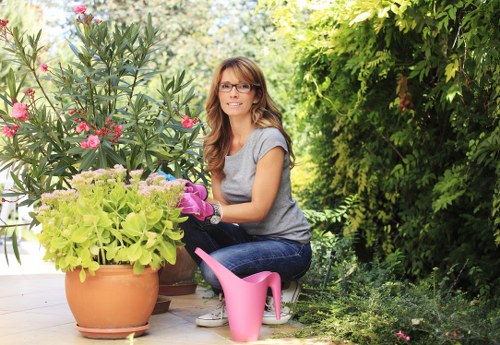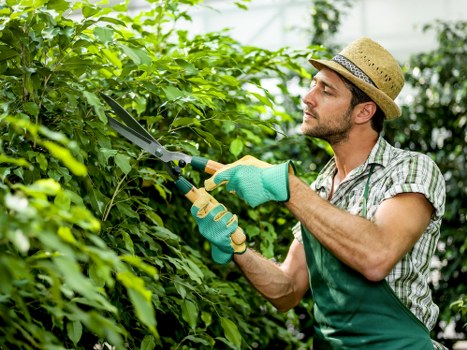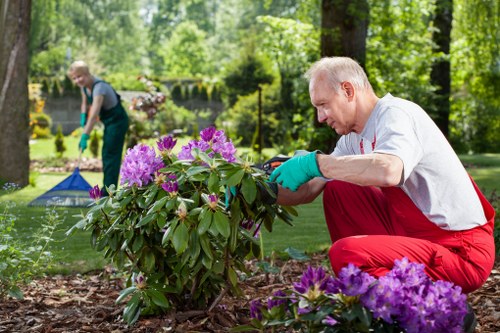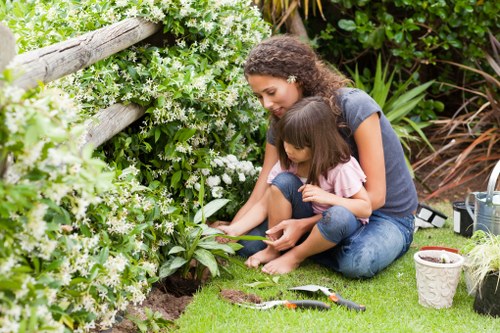Transform Your Outdoor Space: Landscaping in West Ham
Introduction to Landscaping in West Ham

West Ham, a vibrant area known for its rich history and community spirit, offers homeowners a unique opportunity to enhance their properties through expert landscaping. Whether you're looking to create a serene garden retreat or a functional outdoor entertaining space, understanding the essentials of landscaping in this locale is key.
Landscaping in West Ham not only boosts your home's curb appeal but also contributes to environmental sustainability. By selecting the right plants and sustainable practices, you can create a beautiful outdoor area that's both eco-friendly and enjoyable.
In this comprehensive guide, we'll explore the various aspects of landscaping in West Ham, from choosing the right plants to hiring professional landscapers. Let's delve into how you can transform your outdoor space into a stunning haven.
Understanding the Local Climate and Soil

Before embarking on your landscaping journey, it's crucial to understand the local climate and soil conditions of West Ham. The area's temperate climate allows for a diverse range of plants, but selecting those that thrive in these conditions is essential for long-term success.
The soil in West Ham varies, with a mix of clay, loam, and sandy types. Conducting a soil test can help determine the pH level and nutrient composition, guiding you in choosing the right amendments to create a fertile environment for your plants.
Additionally, understanding seasonal changes will aid in planning your landscape design. Incorporating plants that bloom at different times ensures year-round interest and vibrancy in your outdoor space.
Choosing the Right Plants for Your West Ham Garden

Selecting the appropriate plants is a cornerstone of effective landscaping. In West Ham, a mix of native and adaptable non-native plants can provide a resilient and attractive garden.
Native Plants
Native plants are well-suited to the local climate and soil, requiring less maintenance and water. Examples include:
- Lavender: Adds fragrance and attracts pollinators.
- Holly: Provides year-round greenery and berries.
- Foxglove: Offers stunning flower spikes in various colors.
Non-Native Plants
Non-native plants can introduce unique textures and colors to your garden. Ensure they are adaptable and do not become invasive. Popular choices include:
- Hydrangeas: Known for their large, beautiful blooms.
- Hostas: Ideal for shaded areas with lush foliage.
- Roses: Classic flowers that add elegance to any garden.
Designing Functional and Aesthetic Outdoor Spaces

Effective landscaping balances functionality with aesthetics, creating spaces that are both beautiful and practical. Here are key elements to consider:
Hardscaping Features
- Patios and Decks: Provide areas for outdoor gatherings and relaxation.
- Paths and Walkways: Enhance accessibility and guide visitors through your garden.
- Fencing and Walls: Offer privacy and structure to your landscape design.
Softscaping Elements
Softscaping focuses on the living components of your landscape, including:
- Plant Beds: Designated areas for planting flowers, shrubs, and trees.
- Water Features: Ponds, fountains, or waterfalls add tranquility and visual interest.
- Lighting: Enhances the beauty of your garden in the evenings and improves safety.
Integrating Both
Combining hardscaping and softscaping creates a harmonious and cohesive outdoor environment. Consider the flow and balance between structural elements and natural features to achieve a well-rounded design.
Eco-Friendly Landscaping Practices

Sustainability is a growing priority in modern landscaping. Implementing eco-friendly practices not only benefits the environment but also reduces maintenance costs and enhances the health of your garden.
Water Conservation
- Irrigation Systems: Install drip irrigation or smart watering systems to minimize water waste.
- Rain Gardens: Capture and utilize rainwater, reducing runoff and supporting plant health.
- Mulching: Helps retain soil moisture and suppresses weeds.
Soil Health
Maintaining healthy soil is fundamental to sustainable landscaping. Practices include:
- Composting: Recycle organic waste to enrich soil nutrients.
- Cover Crops: Prevent soil erosion and improve soil structure.
- Organic Fertilizers: Use natural amendments to support plant growth without harmful chemicals.
Biodiversity
Encouraging biodiversity supports a balanced ecosystem. Incorporate a variety of plants to attract beneficial insects, birds, and other wildlife.
Hiring Professional Landscapers in West Ham
While DIY landscaping can be fulfilling, hiring professional landscapers ensures a polished and expertly designed outdoor space. Here's why professional services can be beneficial:
Expertise and Experience
Professional landscapers bring a wealth of knowledge in design principles, plant selection, and sustainable practices. Their expertise ensures that your landscape is both beautiful and functional.
Time and Efficiency
Landscaping projects can be time-consuming. Professionals handle the planning, sourcing, and execution, allowing you to enjoy your new garden without the hassle.
Customized Solutions
Every garden is unique. Professional landscapers tailor their services to meet your specific needs and preferences, creating a personalized outdoor space.
Finding the Right Provider
When selecting a landscaping company in West Ham, consider the following:
- Portfolio: Review their past projects to gauge their style and quality.
- Reviews: Read client testimonials to understand their reputation.
- Services Offered: Ensure they provide the specific services you need, such as design, installation, or maintenance.
Seasonal Landscaping Tips for West Ham
Maintaining your garden year-round requires adapting to seasonal changes. Here are some tips to keep your landscape thriving through all seasons:
Spring
- Planting: Ideal time for planting new flowers, shrubs, and trees.
- Pruning: Trim back dead branches to encourage healthy growth.
- Soil Preparation: Add compost or fertilizer to enrich the soil.
Summer
During the warmer months, focus on:
- Watering: Ensure plants receive adequate moisture, especially in dry periods.
- Weeding: Regularly remove weeds to reduce competition for nutrients.
- Pest Control: Monitor for pests and address issues promptly.
Autumn
Prepare your garden for the colder months by:
- Leaf Removal: Clear fallen leaves to prevent mold and pests.
- Plant Protection: Mulch beds to protect roots from frost.
- Tool Maintenance: Clean and store gardening tools properly.
Winter
Even in winter, your garden can remain attractive by:
- Evergreens: Plant evergreens to provide year-round structure and color.
- Decorative Elements: Use garden ornaments and lighting to add visual interest.
- Planning: Plan for next year's garden, taking note of what worked well.
Maximizing Small Outdoor Spaces
Not everyone has a large garden, but innovative landscaping can make small outdoor areas in West Ham both functional and beautiful.
Vertical Gardening
Utilize vertical space by installing trellises, wall planters, or vertical gardens. This approach allows you to grow more plants without taking up valuable ground space.
Compact Plant Varieties
Choose compact or dwarf plant varieties that fit well in smaller spaces. These plants provide lush greenery without overwhelming the area.
Multi-Functional Furniture
Select outdoor furniture that serves multiple purposes, such as storage benches or foldable tables, to maximize utility without clutter.
Creative Landscaping Solutions
Incorporate creative elements like mirrors to create the illusion of more space, or use light colors and reflective surfaces to enhance the sense of openness.
Maintaining Your Landscape
A well-designed landscape requires regular maintenance to stay vibrant and healthy. Here are essential maintenance tips for West Ham gardens:
Regular Pruning and Trimming
Keep plants and shrubs neatly trimmed to promote growth and prevent overgrowth. Regular pruning enhances the overall appearance and health of your garden.
Weed Control
Stay on top of weed removal to reduce competition for nutrients and maintain the beauty of planted areas.
Fertilizing and Soil Care
Provide plants with necessary nutrients through regular fertilization. Adjust soil pH and composition as needed to support plant health.
Pest and Disease Management
Monitor plants for signs of pests or diseases and take appropriate measures to address issues promptly, using eco-friendly solutions when possible.
Seasonal Cleanup
Conduct seasonal cleanups to prepare your garden for changing weather, including removing fallen leaves, dead plants, and debris.
Ongoing Evaluation
Periodically assess your landscape design to identify areas for improvement or updates, ensuring your garden remains a cherished space.
Conclusion: Elevate Your West Ham Home with Expert Landscaping
Landscaping in West Ham offers endless possibilities to enhance your home's beauty, functionality, and sustainability. By understanding local conditions, selecting the right plants, and implementing thoughtful design principles, you can create an outdoor space that reflects your personal style and meets your practical needs.
Whether you choose to embark on a DIY project or hire professional landscapers, investing in your garden pays dividends in both aesthetics and property value. Contact us today to begin transforming your West Ham outdoor space into a stunning retreat.

